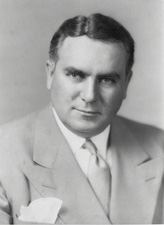Brien McMahon
| Brien McMahon | |
|---|---|
 |
|
|
United States Senator from Connecticut |
|
|
In office January 3, 1945 – July 28, 1952 |
|
| Preceded by | John A. Danaher |
| Succeeded by | William A. Purtell |
| Personal details | |
| Born |
James O'Brien McMahon October 6, 1903 Norwalk, Connecticut, U.S. |
| Died | July 28, 1952 (aged 48) Washington, D.C., U.S. |
| Political party | Democratic |
| Alma mater |
Fordham University Yale Law School |
| Signature |  |
Brien McMahon, born James O'Brien McMahon (October 6, 1903 – July 28, 1952) was an American lawyer and politician who served in the United States Senate (as a Democrat from Connecticut) from 1945 to 1952. McMahon was a major figure in the establishment of the Atomic Energy Commission, through his authorship of the Atomic Energy Act of 1946 (the McMahon Act).
McMahon served as chairman of the Senate Special Committee on Atomic Energy, and the first chairman of the Joint Committee on Atomic Energy. McMahon was a key figure in the early years of atomic weapons development and an advocate for the civilian (rather than military) control of nuclear development in the USA. Also, in 1952, McMahon proposed an "army" of young Americans to act as "missionaries of democracy", which sowed the seeds for what later became the Peace Corps.
McMahon was born James O'Brien McMahon in 1903 in Norwalk, Connecticut. McMahon graduated Fordham University in 1924. and then Yale Law School, New Haven, Connecticut in 1927. McMahon changed his name to Brien McMahon the same year as being admitted to the bar.
...
Wikipedia
